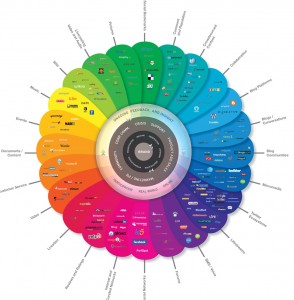 ‘Digital is not a medium’ is a post that I have wanted to write for a long time – but that I have repeatedly stopped myself doing because it simply feels too obvious; but obvious as it might seem there are still too many occasions where I am forced to re-explain. So this article should act more as a definition, a base explanation from which we can take future conversations to a new level.
‘Digital is not a medium’ is a post that I have wanted to write for a long time – but that I have repeatedly stopped myself doing because it simply feels too obvious; but obvious as it might seem there are still too many occasions where I am forced to re-explain. So this article should act more as a definition, a base explanation from which we can take future conversations to a new level.
I wrote a few weeks ago that ‘Digital is not a channel, it is part of your product‘ but for agencies this can sometimes seem a little daunting, as it sends the ball back to the client telling them to get their product(s) straight before they think about communicating – this being said, digital for many agencies is seen as just another medium. We added radio to press and outdoor in the early 1900 and then TV joined the fray about 20 years later. These were in the most basic sense of the term the addition of new channels, new media that we could use for the commercialisation of messages. The arrival of the internet and both search and display advertising was also the advent of a new medium, when we limit ourselves to these two executions then we can look at them as specific channels and use them in the same way. But today we talk about digital, and digital is not a medium.
Digital is probably as far from an individual medium as we could possibly get – digital is a way of thinking, a way of working, a way of producing and it has changed every part of our business, not least the output. From an internal POV, digital has changed the process of desktop-publishing, the way we communicate with each other, the complexity of our products and also the speed with which we can deliver. But from an external POV, digital has changed society, giving them the chance to access information in quantity and quality like never before (the internet), to communicate with people across the world as easily as those right next door (email, VOIP, IM) and also to therefore create and share their opinions (blogs, social media). So this means that we need to change the way that we develop communication, to become part of a global conversation – the conversation prism developed by Brian Solis and JESS3 is a way of looking at this – at understanding how digital has changed conversations simply from one-to-one to one-to-many and how they have grown out of the private lives of individuals to become part of society and culture. This participation by individuals in global conversations has come to fight alongside media and communications campaigns for what has always been referred to as ‘share of voice’ – unfortunately today this voice is not simple brands in media, but brands, companies, groups and individuals across the globe giving their input and opinion.
So digital has changed the world, putting control in the hands of everyone (regardless of their ability to buy media) and we now need to understand how this changes the traditional agency’s communication product – this means accepting the fact that engagement doesn’t me a quick yes/no answer but about getting individuals involved in what we produce and how it lives in the market, and in fact that messages that are only one-way, that do not involve the end users, will eventually be ignored, because as consumers if we cannot interact to understand we will just block out what feels like old world advertising. For communications planning this means understanding how the targets interact with the brand and how they will react to the messages that we put out there, how we can use them to take this message further, and finally how we can make it feel their own, so that every individual can finally become either the salesman or the executioner for our product or brand.
This isn’t new, but it is an expression of the desire to say that digital is everywhere, in everything, if we want to talk about advertising we need to think about channels, specific channels and how we can act in them – be they websites, Facebook, or mobile.

3 comments